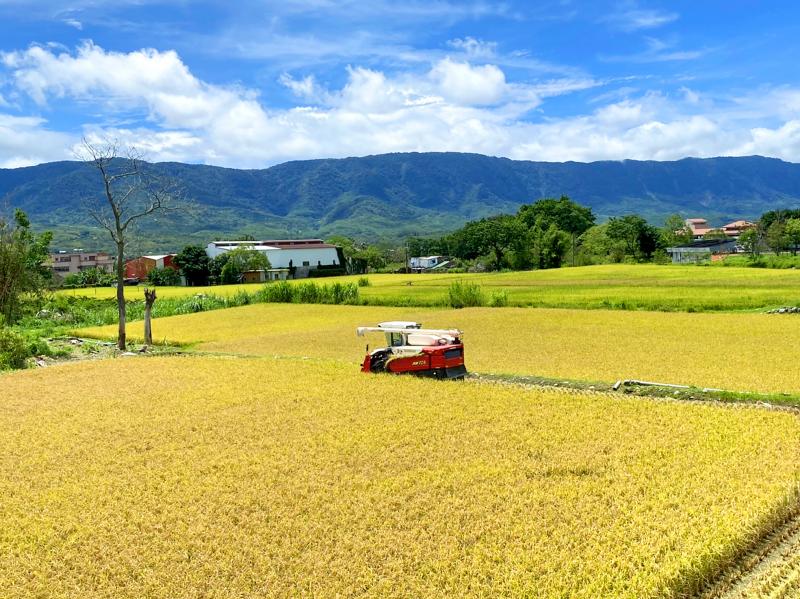The Ministry of Economic Affairs yesterday announced that it was easing water restrictions in several regions, thanks to rainfall over the past few days.
The water supply alert level has been downgraded from “orange” to “yellow” for Taoyuan and Hsinchu and Miaoli counties, and from “orange” to “green” for Tainan and Chiayi County, the ministry said.
Only Taichung remains under “orange” alert, with round-the-clock decreased water pressure, it said.

Photo: Chen Hsien-i, Taipei Times
A combination of water management measures and considerable plum rains and tropical showers has seen reservoirs significantly replenished across the nation, Minister of Economic Affairs Wang Mei-hua (王美花) said.
Just weeks ago water levels at local reservoirs were below 10 percent, as the nation faced the worst drought in a generation.
However, the turnaround has been quick, with the water level at the Shihmen Reservoir (石門水庫) in Taoyuan rising from a low of 9 percent to 55 percent, the ministry said.
Hsinchu’s Baoshan Reservoir (寶山水庫) and Baoshan Second Reservoir (寶二水庫), which serve the Hsinchu Science Park, also saw water levels rise from 3 percent to 77 percent, while the Nanhua Reservoir (南化水庫) increased from 8 percent to 100 percent, it said.
“We expect another wave of plum rain this week to fully replenish the Hushan Reservoir (湖山水庫), Sun Moon Lake (日月潭) and the two Baoshan reservoirs,” Wang said. “However, Taichung’s Liyutan Reservoir (鯉魚潭水庫) and the Techi Reservoir (德基水庫) are still lower than ideal at 47 percent and 26 percent respectively, meaning we have to keep Taichung under ‘orange’ alert for now.”
The drought had ruined the first-season rice crop for most farmers due to a lack of irrigation.
The Water Resources Agency is working with the Council of Agriculture to expedite irrigation for the second-season rice crop “wherever possible” and plans to prioritize using water from ponds, rivers and other sources to begin limited irrigation, agency Deputy Director-General Wang Yi-feng (王藝峰) said.
Limited irrigation is to start in some areas in the nation’s “rice granary,” such as the Chianan Plain (嘉南平原), as well as some areas in Taoyuan and Miaoli and Hsinchu counties.
More regions will hopefully be included on a rolling basis as rains continue to fall and reservoirs continue to fill, he said.
However, as the plum rain this week might cause short, intense rainfall, he said the agency’s most urgent mission has changed from fighting drought to fighting potential flooding, adding that 1,528 mobile pumps are on standby in case of floods.
“After the challenge of the drought of the century, we will continue to work to make Taiwan’s water supply more resilient going forward,” he said. “This includes more emergency wells, desalination plants and other mid to long-range projects.”

RUN IT BACK: A succesful first project working with hyperscalers to design chips encouraged MediaTek to start a second project, aiming to hit stride in 2028 MediaTek Inc (聯發科), the world’s biggest smartphone chip supplier, yesterday said it is engaging a second hyperscaler to help design artificial intelligence (AI) accelerators used in data centers following a similar project expected to generate revenue streams soon. The first AI accelerator project is to bring in US$1 billion revenue next year and several billion US dollars more in 2027, MediaTek chief executive officer Rick Tsai (蔡力行) told a virtual investor conference yesterday. The second AI accelerator project is expected to contribute to revenue beginning in 2028, Tsai said. MediaTek yesterday raised its revenue forecast for the global AI accelerator used

TEMPORARY TRUCE: China has made concessions to ease rare earth trade controls, among others, while Washington holds fire on a 100% tariff on all Chinese goods China is effectively suspending implementation of additional export controls on rare earth metals and terminating investigations targeting US companies in the semiconductor supply chain, the White House announced. The White House on Saturday issued a fact sheet outlining some details of the trade pact agreed to earlier in the week by US President Donald Trump and Chinese President Xi Jinping (習近平) that aimed to ease tensions between the world’s two largest economies. Under the deal, China is to issue general licenses valid for exports of rare earths, gallium, germanium, antimony and graphite “for the benefit of US end users and their suppliers

Dutch chipmaker Nexperia BV’s China unit yesterday said that it had established sufficient inventories of finished goods and works-in-progress, and that its supply chain remained secure and stable after its parent halted wafer supplies. The Dutch company suspended supplies of wafers to its Chinese assembly plant a week ago, calling it “a direct consequence of the local management’s recent failure to comply with the agreed contractual payment terms,” Reuters reported on Friday last week. Its China unit called Nexperia’s suspension “unilateral” and “extremely irresponsible,” adding that the Dutch parent’s claim about contractual payment was “misleading and highly deceptive,” according to a statement

The Chinese government has issued guidance requiring new data center projects that have received any state funds to only use domestically made artificial intelligence (AI) chips, two sources familiar with the matter told Reuters. In recent weeks, Chinese regulatory authorities have ordered such data centers that are less than 30 percent complete to remove all installed foreign chips, or cancel plans to purchase them, while projects in a more advanced stage would be decided on a case-by-case basis, the sources said. The move could represent one of China’s most aggressive steps yet to eliminate foreign technology from its critical infrastructure amid a